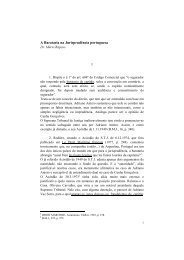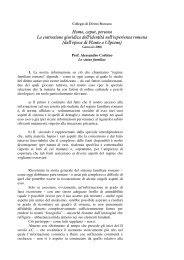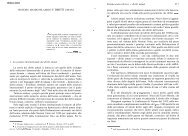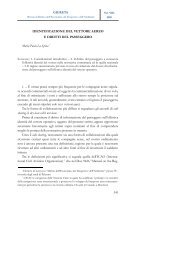The Old and the New Limits to Freedom of Contract in Europe
The Old and the New Limits to Freedom of Contract in Europe
The Old and the New Limits to Freedom of Contract in Europe
You also want an ePaper? Increase the reach of your titles
YUMPU automatically turns print PDFs into web optimized ePapers that Google loves.
268 Maria Rosaria Marella<br />
ERCL 2/2006<br />
state <strong>in</strong>tervention <strong>in</strong> <strong>the</strong> social conflict regarded as such) <strong>to</strong> <strong>the</strong> achievement<br />
<strong>of</strong> <strong>the</strong> social equilibrium that is granted by respect <strong>of</strong> fundamental rights. 31<br />
<strong>The</strong>re are two classic arguments aga<strong>in</strong>st <strong>the</strong> social model <strong>and</strong> <strong>the</strong> rhe<strong>to</strong>ric <strong>of</strong><br />
weak parties. One is that new limits <strong>to</strong> freedom <strong>of</strong> contract for family guarantees<br />
or prenuptial agreements, for <strong>in</strong>stance, generate <strong>the</strong> <strong>in</strong>direct effect <strong>of</strong><br />
restrict<strong>in</strong>g access <strong>to</strong> credit <strong>and</strong> <strong>to</strong> marriage respectively, at <strong>the</strong> expense <strong>of</strong> <strong>the</strong><br />
beneficiaries <strong>of</strong> <strong>the</strong> protect<strong>in</strong>g policy <strong>the</strong>mselves. <strong>The</strong> second argument is that<br />
strong protection <strong>of</strong> weak parties generates a pattern <strong>of</strong> cross-subsidies at <strong>the</strong><br />
expense <strong>of</strong> <strong>the</strong> weakest social groups. <strong>The</strong> protection <strong>of</strong> <strong>the</strong> weak parties<br />
turns out <strong>to</strong> exclude people at <strong>the</strong> bot<strong>to</strong>m <strong>of</strong> <strong>the</strong> social pyramid: <strong>the</strong>re will<br />
always be weak parties that are weaker than <strong>the</strong> weak parties protected by<br />
protect<strong>in</strong>g policy. 32 Or <strong>the</strong>re are always weak parties that are not acknowledged<br />
as such. How about mistresses or best friends, as <strong>in</strong><strong>the</strong> case <strong>of</strong> family<br />
guarantees? How about non-pregnant women as <strong>to</strong> <strong>the</strong> case <strong>of</strong> prenuptial<br />
agreements? And what about domestic contracts concluded by unmarried<br />
partners?<br />
In my own view, however, <strong>the</strong>re is a strong argument aga<strong>in</strong>st this <strong>Europe</strong>an<br />
social model: it is that it shapes limits <strong>to</strong> freedom <strong>of</strong> contract on <strong>the</strong> basis<br />
<strong>of</strong> <strong>the</strong> <strong>in</strong>determ<strong>in</strong>acy <strong>of</strong> fundamental rights (constitutional pr<strong>in</strong>ciples might<br />
entail moral or efficiency reasons that conflict with one ano<strong>the</strong>r); that it emphasises<br />
fundamental rights ra<strong>the</strong>r than equality or it emphasises <strong>in</strong>equality<br />
only through <strong>the</strong> violation <strong>of</strong> fundamental rights. In so do<strong>in</strong>g, it not only<br />
31 By contrast, <strong>in</strong> <strong>the</strong> liberal <strong>in</strong>terpretation <strong>of</strong>fered by Teubner, n 18 above, <strong>the</strong> Bundesverfassungsgericht’s<br />
enforcement <strong>of</strong> constitutional pr<strong>in</strong>ciples is <strong>to</strong> be <strong>in</strong>terpreted not <strong>in</strong><br />
relation <strong>to</strong> <strong>the</strong> (questionable) violation <strong>of</strong> <strong>in</strong>dividual fundamental rights, but <strong>in</strong> consideration<br />
<strong>of</strong> <strong>the</strong> defence <strong>of</strong> those constitutional ground rules that govern <strong>the</strong> different<br />
areas <strong>of</strong> social life, like <strong>the</strong> family, with its Grundnorm: solidarity, <strong>and</strong> <strong>the</strong> market,<br />
based on <strong>the</strong> <strong>in</strong>dividual rational choice.<br />
Ano<strong>the</strong>r way <strong>of</strong> putt<strong>in</strong>g <strong>the</strong> question is <strong>the</strong> idea that claims <strong>of</strong> freedom <strong>in</strong> contract law<br />
are not <strong>to</strong> be exclusively balanced aga<strong>in</strong>st claims <strong>of</strong> social welfare <strong>and</strong> distributive<br />
justice; that contractual doctr<strong>in</strong>es have not only an enabl<strong>in</strong>g but also a cautionary function;<br />
that contract law should endorse not only freedom <strong>of</strong> contract but also freedom<br />
from contract. See T. D. Rak<strong>of</strong>f, ‘Is “<strong>Freedom</strong> from <strong>Contract</strong>” Necessarily a Libertarian<br />
<strong>Freedom</strong>?’ (2004) Wiscons<strong>in</strong> Law Review 477. <strong>Limits</strong> <strong>to</strong> freedom <strong>of</strong> contract are not<br />
necessarily limits <strong>to</strong> liberty: on <strong>the</strong> contrary, some contracts are not permitted <strong>and</strong> some<br />
o<strong>the</strong>rs are permitted only if legal requirements are fulfilled <strong>in</strong> order <strong>to</strong> protect freedom<br />
from contract. <strong>The</strong> Weberian idea that ‘how freedom <strong>of</strong> contract works out <strong>in</strong> practice<br />
depends on social conditions’, underlies this position as well as <strong>the</strong> social <strong>in</strong>terpretation<br />
<strong>of</strong> para 138 BGB.<br />
However <strong>the</strong> same is true for freedom from contract, <strong>to</strong>o. Also freedom from contract<br />
performs its libertarian role if social conditions permit it.<br />
32 Kennedy, n 28 above.














![Luigi Sapio Nozione di islām La parola “islām” [ ] è il mas.dar1 ...](https://img.yumpu.com/15836073/1/185x260/luigi-sapio-nozione-di-islam-la-parola-islam-e-il-masdar1-.jpg?quality=85)

